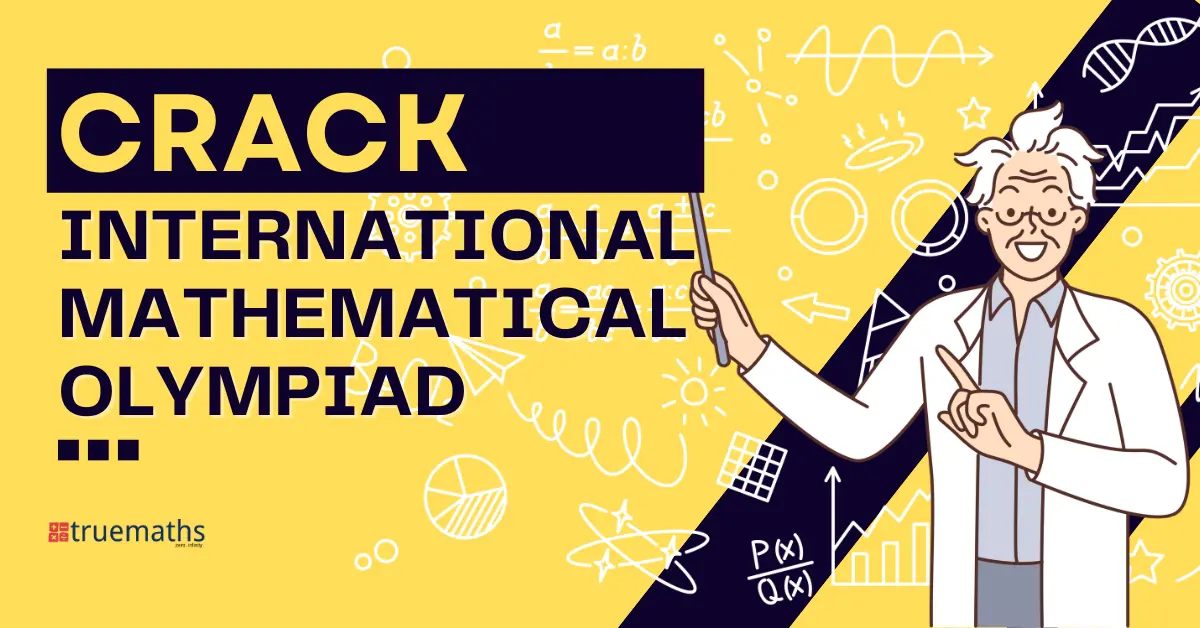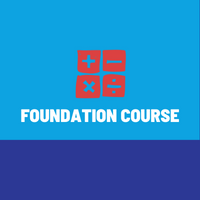Crack International Mathematical Olympiad
By Truemaths Tech, Last Updated 16 Oct, 2023 12 min read

About International Mathematical Olympiad
Are you preparing for a world-level mathematical exam? If yes, let’s understand the International Mathematical Olympiad (IMO) in detail. Think of it as the Olympics for math geeks! It’s not your typical school Math test – it’s a global competition where students from all over the world come together to solve really tough math problems. Whether you’re a student aiming for math glory or a parent cheering from the sidelines, this is your go-to guide for everything you need to know about the IMO. We’ll break it down and make it easy to understand.
International Mathematical Olympiad – Exam Highlights
| Feature | Description |
|---|---|
| Full Exam Name | International Mathematical Olympiad (IMO) |
| Short Exam Name | IMO |
| Conducting Body | Science Olympiad Foundation |
| Frequency of Conduct | Once a year |
| Medium | English |
| Mode of Application | Offline |
| Application Fee (General) | 125 Rs [Offline] |
| Examination Mode | Offline |
| Duration | 1 Hour |
| History | First held in 1959, a prestigious math competition |
| Participation | Over 100 countries represented annually |
| Problems | Six challenging math problems to solve |
| Question Types | Focus on number theory, geometry, algebra, and combinatorics |
| Awards | Gold, silver, bronze medals, honorable mentions, and special prizes |
| Networking | Opportunities to connect with young math enthusiasts globally |
| Foundation | Requires a strong understanding of fundamental math concepts |
| Preparation | Extensive problem-solving practice and math club involvement are common |
| Resources | Access to past IMO papers, math books, and online platforms for practice |
The main Aims of IMO

If you’re gearing up to participate in the world’s most prestigious mathematical competition, it’s crucial to approach your preparation with unwavering dedication and enthusiasm. With students from all corners of the globe, it’s vital to understand the core mission of the International Mathematical Olympiad (IMO).
This understanding will not only guide your journey but also provide a clear perspective on what participation entails. So here, have a look at 3 major aims of IMO:
- Discover and Encourage Young Mathematical Talent: The IMO aims to find and support young people like you who have a natural gift and passion for mathematics. It’s a platform where your mathematical skills and talents can shine, and you can be recognised for your abilities.
- Challenge Your Abilities: The IMO is not just about solving ordinary math problems; it’s about pushing the boundaries of your mathematical knowledge and problem-solving skills. It challenges you with complex and creative problems, allowing you to test and improve your abilities.
- Exchange of Knowledge and Ideas: By participating in the IMO, you get to learn about different mathematical practices and approaches from students and teachers from around the globe. It’s a chance to exchange information on how math is taught and practised in different countries, broadening your understanding of the subject.
How to Participate in IMO?
Steps to Participate in International Mathematical Olympiad (IMO)

- Check your Eligibility for IMO
So, the first step is to check that whether you are eligible to participate in International Mathematical Olympiad or not. In India, you must be in age range of 13 to 19 years and enrolled in a recognized educational institution. - Start your Preparation
To let you that there are many students who spend a lot of years in preparing for this world-level competition. The fight won’t be easy so start your preparation right away. Start having a solid foundation in algebra, geometry, number theory, combinatorics, and other mathematical concepts. - Participate in Regional Mathematical Olympiads
Now, once you are confident that you are prepared start participating in regional level Mathematical Olympiads. conducted by various regional mathematical associations or bodies. Do well in them and you are good to go for the next step. - Clear the Indian National Mathematical Olympiad
The INMO is more challenging test. You need to be really good at Mathematics to clear this exam. And of course, it is a significant step to appear in the International Mathematical Olympiad. But, it will never be easy and you will definitely need an expert guidance to reach this level. - Join the Training Camp
Once you do well in the Indian National Math Competition, you might get invited to participate in a training camp where you’ll receive intensive coaching and problem-solving practice. At the end of the camp, the teachers will pick the best students to be on the team that represents India at the big international math contest called the IMO. - Wait for the Final Selection
After this training, you are ready to participate in IMO. You are very near to your dream. Hold on! This is your time to shine. We must tell you after all these steps, merely participating in the Olympiad on International level is a big achievement. If f you are selected among a team of six students, along with a team leader and a deputy leader, you’ll represent India at the International Mathematical Olympiad. - Participate in the International Mathematical Olympiad
The big moment has finally come. So, once you follow all the steps, its time for your participation in Mathematical Olympiad of International level which is held in a different country each year usually in the month of July. - International Recognition
So, even the participation is a significant achievement. If you secure position among the top scorers, you will receive medals, and even a successful participation can open doors to scholarships and opportunities for further study in mathematics.
Check your Eligibility
Check your Eligibility for International Mathematical Olympiad
So, you are ready to participate in the biggest International Mathematical Olympiad, check your eligibility first.
- You should be under 20 years old on July 1st in the year of the IMO. This means you need to be born on or after July 1 of a specific year to take part.
- You must be studying in a school in India, like high school. It’s for Indian kids, but sometimes kids from other countries living in India can join too.
- To get into the Indian team, you first need to do well in the Regional Mathematical Olympiad (RMO). It’s the beginning of the selection process.
- After doing well in the RMO, you have to qualify for the Indian National Mathematical Olympiad (INMO). Doing well here is a big step toward representing India at the IMO.
- If you make it through the INMO, you might be asked to attend special training camps. There, they’ll teach you more about math and problem-solving.
- The final 6 students team to go to the International Mathematical Olympiad is picked based on how well students do in these camps.
Good Luck! Now, if you have checked your eligibility then its time to move further and check more important details of this exam.
International Mathematical Olympiad 2024 – Important Dates
IMO 2024 is the 65th International Mathematical Olympiad. The IMO, once with only seven countries, has now expanded to include over a hundred nations, making it the largest and most prestigious of all international math competitions.
Now, if your goal is to excel in the IMO, make sure to mark these significant dates on your calendar.
- Thursday, 15th February, 2024: Last day for online confirmation of participation by countries and territories.
- Monday 1st April, 2024: Last day to request a paper official invitation to be posted to your country or territory.
- Tuesday, 23rd April, 2024: Last day for receipt of problem proposals. Proposals can only be submitted through the IMO official portal.
- Tuesday 23rd April, 2024: Last day for online registration of leaders, deputy leaders, observers, the number of contestants and arrival day for leaders and observers.
- Monday 20th May, 2024: Last day for full payment of charges for single rooms and observers in cleared funds. Please use the reference IMO2024 and your country or territory’s name.
- Friday, 31st May, 2024: Last day for online registration of contestants.
- Saturday 15th June, 2024: Last day for online registration of all travel details (please fill this in earlier if you can)
International Mathematical Olympiad Pattern
IMO Level 1 (Classes 1 – 4) Exam Pattern & Marking Scheme
| Section | No. of Questions | Marks/Questions | Total Marks |
| Section 1: Logical Reasoning | 10 | 1 | 10 |
| Section 2: Mathematical Reasoning | 10 | 1 | 10 |
| Section 3: Everyday Mathematics | 10 | 1 | 10 |
| Section 4: Achievers Section | 5 | 2 | 10 |
| Grand Total | 35 | 40 |
IMO Level 1 (Classes 5 – 12) Exam Pattern & Marking Scheme
| Section | No. of Questions | Marks/Questions | Total Marks |
| Section 1: Logical Reasoning | 15 | 1 | 15 |
| Section 2: Mathematical Reasoning | 20 | 1 | 20 |
| Section 3: Everyday Mathematics | 10 | 1 | 10 |
| Section 4: Achievers Section | 5 | 3 | 15 |
| Grand Total | 50 | 60 |
IMO Level 2 (Classes 3 – 4) Exam Pattern & Marking Scheme
| Section | No. of Questions | Marks/Questions | Total Marks |
| Section 1: Mathematics | 30 | 1 | 30 |
| Section 2: Achievers Section | 5 | 2 | 10 |
| Grand Total | 35 | 40 |
IMO Level 2 (Classes 5 – 12) Exam Pattern & Marking Scheme
| Section | No. of Questions | Marks/Questions | Total Marks |
| Section 1: Mathematics | 45 | 1 | 45 |
| Section 2: Achievers Section | 5 | 3 | 15 |
| Grand Total | 50 | 60 |
Before appearing in the exam, you must be well aware of the format of the International Mathematical Olympiad. IMO consists of two important rounds: a written examination and a team competition.
Written Examination:
In this round, participants face a set of challenging math problems. These problems are like exciting puzzles that require clever thinking and problem-solving skills. But there’s a twist – you have to solve them in a limited amount of time. Imagine it as a race against the clock to crack these brain teasers.
Team Competition:
The team competition is where things get even more interesting. Here, the participants work together as a team. They collaborate and put their math skills to the test to solve another set of problems. It’s like a group adventure where everyone combines their brainpower to tackle these tricky math challenges. Teamwork and cooperation are the keys to success in this part of the competition.
International Mathematical Olympiad Syllabus
- Basic arithmetic operations: Addition, subtraction, multiplication, and division.
- Introduction to numbers, counting, and basic shapes.
- Simple patterns and sequences.
- Continued focus on arithmetic: Multiplication tables, long addition, subtraction, and basic word problems.
- Basic geometry: Identifying and understanding geometric shapes, measurement of length, area, and volume.
- Introduction to fractions, decimals, and percentages.
- Basic number theory: Prime and composite numbers, divisibility, and factors.
- Advanced arithmetic: More complex addition, subtraction, multiplication, and division problems.
- Geometry: Understanding angles, triangles, quadrilaterals, and basic concepts of symmetry.
- Fractions, decimals, percentages, and their conversions.
- Number theory: Prime numbers, LCM, GCD, and prime factorisation.
- Basic algebraic concepts: Simple equations and expressions.
- Advanced arithmetic: More complex word problems, multiplication, and division.
- Geometry: Properties of triangles, circles, and basic coordinate geometry.
- Number theory: Divisibility rules, congruences, and modular arithmetic.
- Combinatorics: Basic counting principles, permutations, and combinations.
- Advanced arithmetic: Multi-digit multiplication and division, decimals, and percentages.
- Geometry: Advanced properties of polygons, transformations, and 2D coordinate geometry.
- Number theory: Prime factorisation, LCM, GCD, and basic modular arithmetic.
- Combinatorics: Pigeonhole principle, basic probability, and simple combinatorial problems.
- Algebra: Introduction to algebraic expressions and equations.
- Geometry: Properties of circles, areas, and volumes, coordinate geometry.
- Number theory: Prime numbers, divisibility rules, and prime factorisation.
- Combinatorics: Counting principles, permutations, and combinations.
- Basic trigonometry and its applications.
- Algebra: Solving linear equations and quadratic equations.
- Geometry: Advanced properties of triangles, quadrilaterals, and 2D coordinate geometry.
- Number theory: Divisibility rules, congruences, modular arithmetic.
- Combinatorics: Pigeonhole principle, basic graph theory, and probability.
- Algebra: Advanced equations, inequalities, and functions.
- Geometry: Properties of circles, coordinate geometry, and 3D geometry.
- Number theory: Prime numbers, modular arithmetic, congruences.
- Combinatorics: Pigeonhole principle, inclusion-exclusion principle, and basic graph theory.
- Introduction to calculus: Limits and derivatives (optional, depending on the curriculum).
- Algebra: Quadratic equations, inequalities, polynomials, and advanced functions.
- Geometry: Euclidean geometry, trigonometry, and coordinate geometry.
- Number theory: Diophantine equations, congruences, prime numbers, modular arithmetic.
- Combinatorics: Pigeonhole principle, inclusion-exclusion principle, and basic graph theory.
- Introduction to calculus: Limits and derivatives.
- Advanced algebra: Complex numbers, inequalities, and advanced functions.
- Geometry: Advanced topics in Euclidean geometry, transformations, and three-dimensional geometry.
- Number theory: Advanced properties of integers, quadratic residues, and more.
- Combinatorics: Generating functions, extremal combinatorics, and advanced graph theory.
- Calculus: Limits, derivatives, integrals, sequences, and series.
- Advanced algebra: Complex numbers, inequalities, and advanced functions.
- Geometry: Advanced topics in Euclidean geometry, coordinate geometry, and three-dimensional geometry.
- Number theory: Advanced properties of integers, quadratic residues, and more.
- Combinatorics: Generating functions, extremal combinatorics, and advanced graph theory.
- Calculus: Limits, derivatives, integrals, sequences, and series.
- Advanced algebra: Complex numbers, inequalities, and advanced functions.
- Geometry: Advanced topics in Euclidean geometry, coordinate geometry, and three-dimensional geometry.
- Number theory: Advanced properties of integers, quadratic residues, and more.
- Combinatorics: Generating functions, extremal combinatorics, and advanced graph theory.
- Calculus: Limits, derivatives, integrals, sequences, and series.
Application Process 2024
How to Apply for International Mathematical Olympiad?
To apply for the International Mathematical Olympiad (IMO), follow the following steps:
- Eligibility Check: Ensure you meet the age and grade requirements established by your country’s IMO organizing committee.
- Contact Your National IMO Committee: Get in touch with the national organization responsible for selecting and organizing the IMO team for your country.
- Express Your Interest: Inform the national IMO committee of your interest in participating. They will guide you through the registration process.
- Qualify: Participate in regional and national mathematical competitions and Olympiads. Your performance in these competitions may determine your eligibility for the IMO.
- Selection: If you qualify, you may be invited to the national selection process, which could involve additional exams or training.
- Team Selection: Once the selection process is complete, the national IMO committee will choose the team members who will represent your country at the IMO.
- Registration Forms: Complete the necessary registration forms provided by your national IMO committee. These forms will typically include personal information, contact details, and any required documentation. Submit the fees and complete the documentation.
You are all set to participate in the IMO. Now, travel to the host country and take part in the IMO competition.
How to Prepare for the International Mathematical Olympiad – Get Coaching

If you are planning to crack the International Mathematical Olympiad smoothly, you surely need somebody to assist you. Enrol with us and you get help from experienced teachers, lots of study materials, plenty of practice, and a deep grasp of different math ideas. We’re here to help you in your journey to excel in the IMO right from the regional to the international level.
Experienced Teachers: Our coaching team is composed of expert teachers who bring more than 25 years of experience, ensuring that you receive the best guidance and mentorship to crack the International Mathematical Olympiad.
Comprehensive Study Materials: We provide a curated collection of study materials that cover all the fundamental topics and advanced concepts required for IMO preparation. These materials serve as a solid foundation for your studies.
Mock Tests and Practice Papers: To assess your progress, we offer a series of mock tests and practice papers, which will make you more comfortable with the exam format.
Regional to International Level Preparation: Our program is designed to guide you from regional level competitions to the international stage. Our educators will stay with you throughout this journey, right from the beginning to making you an International champion.
AI-Based Learning Platform: Our cutting-edge online platform employs artificial intelligence and machine learning to provide a seamless learning experience. You can access study materials, practice tests, and monitor your progress, all on a single platform.
Activity-Based Learning: Our approach is built on the concept of activity-based learning, making math more engaging and enjoyable. This approach enables you to grasp complex mathematical concepts more effectively.
Wide Range of Topics: You will get to explore a wide variety of math areas, including Vedic Math, reasoning, creating formulas, number games, mathematical language, grasping connections between quantities, practical uses, using different strategies for problem-solving, making estimates, thinking analytically, and finding solutions to problems. This will help you to crack the International Mathematical Olympiad in your first attempt.
Stage of Selection for IMO
The path to the International Mathematical Olympiad (IMO) is a challenging one, and you have to be vigilant at every step. At each level, from local to national to international, there are exams and competitions, and you need to do really well in each of them to move forward. It’s like a tough game, and you have to keep winning at each level to finally reach the international stage of the Olympiad. So, be prepared for a series of challenges, and remember that every level is a stepping stone towards the ultimate goal.

International Mathematical Olympiad 2024 Result
So, if we talk about the final result of the International Mathematical Olympiad 2024, nothing can be said for sure. But, as per the dates of last year’s results, we can decide the tentative dates for the year 2024.
| Event | Dates |
| IMO Level 1 Exam Date | 31 October 2024, 30 November 2024, 14 December 2024 |
| IMO Level 1 Result | January 2025 |
| IMO Level 2 Exam Date (Classes 3 – 12) | February 2025 |
| Maths Olympiad Result Level 2 | March 2025 |
Expert Advice
We have talked to our experts who have more than 25 years of experience in preparing students for the International Mathematical Olympiad and brought out the 3 best expert advice that you could ever get.
First of all, if you are preparing for IMO, consider teaching others to deepen your understanding. Secondly, diversify your resources by exploring materials from different countries. Lastly, foster cross-disciplinary connections with subjects like physics or computer science to enhance your problem-solving skills and broaden your mathematical perspective.
We’re here to provide the support and mentorship you need to excel in the IMO. Don’t hesitate to reach out for expert guidance and assistance in your preparation.
FAQs
What is the International Mathematical Olympiad (IMO)?
The IMO is an international mathematics competition for pre-university students taking place annually. We will host the 2025 IMO on the Sunshine Coast, Australia, from 2025 July 10–20. The IMO consists of mathematically difficult problems in algebra, geometry, number theory and combinatory.
Who can enter the IMO?
All individuals from each competing country who are under 20 years of age on or before July 1, 2025, and who have not started university, qualify for entry into the IMO, upon selection. Each participating country decides how to select its individual contestants. Typically, a country may use a national Olympiad along with other numerical and subjective indicators of mathematics ability.
How can my child enter the IMO?
To enter the IMO, it comes down to success in national math Olympiads. For quite a few countries such as India, there are qualifiers, for example IOQM, RMO, INMO, which are indicative of entering the IMO Training Camp. Registration details can be found the HBCSE is a starting point. This proves an opportunity for young explorers! For an entry to the IMO, your child will need to prepare well enough to qualify for the IMO Training Camp potential from the expert guidance Truemaths offers.
Are calculators allowed during the competition?
No. You will not be allowed a calculator and will not be able to use any electronic devices. When completing the problems, you will be expected to complete all the necessary calculations using pen and paper as appropriate, purely through mathematical reasoning.
What is the format of the IMO competition?
The IMO will run over two days (July 15 and 16, 2025). Each day will consist of three problems which are individually worth 7 points, creating a total of 42. You will be asked to complete as many of them as you can in 4.5 hours each day. There is no team aspect to the competition and you will be individually evaluated.
Is there an award for participants from the IMO?
The top 50% of participants get gold, silver, or bronze medals and awards for honorable mentions for their performances. Top performers may also receive special prizes or scholarships.
Is participating in the IMO helpful for a college application?
Yes! Participating in the IMO adds tremendous benefit to a college application. It clearly shows exceptional mathematical skill and the ability to solve difficult problems, which is especially useful for applicants to STEM-related fields.
How can my child prepare for the IMO?
There are a lot of ways to prepare for the IMO. Have them work on solving past problems from the IMO, make sure they are comfortable with core concepts in algebra, geometry, and number theory, and engage in training programs like Truemaths training programs. They have 25+ years of experience as well as mock tests!


























